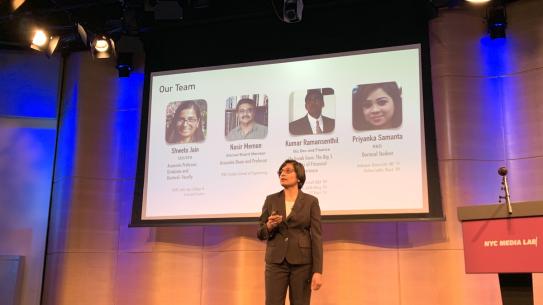Tandon teams take the entrepreneurial stage

Participants at NYC Media Lab's Combine program Demo Day
This year the NYC Media Lab — a Brooklyn–based consortium of the city’s universities and private-sector partners — accepted a fourth cohort into their “Combine” program, which is aimed at helping commercialize the innovative technology emerging from university labs, studios, and classrooms across the city.
NYU is an integral part of the consortium, and three of the nine teams included members of the NYU Tandon community — no surprise given the school’s focus on entrepreneurship and practical problem-solving.
Teams in the cohort had each been awarded an initial grant of $10,000 upon embarking upon the intensive 12-week program of customer discovery and market validation in January, and in early April the Media Lab hosted a Demo Day that showcased the fruits of their hard work.
Anne del Castillo, acting commissioner of the New York City Mayor's Office of Media and Entertainment, and Karen Bhatia, a senior vice president of the New York City Economic Development Corporation, were on hand to cheer on the teams as well as to applaud the efforts of Media Lab Executive Director Justin Hendrix and Director of Entrepreneurship Programs Amy Chen.
Tandon faculty members, alumni, and students were involved in:
eWitness

The Problem: In an era of Photoshop and other widespread ways of manipulating digital content, how can we really believe what we see?
The Solution: Images and videos taken with a smartphone camera are often put forth as evidence of crime, human rights violations, domestic violence, corruption, traffic violations, and more, and eWitness uses blockchain technology to establish the provenance of that evidence. The technology behind the product, developed in part by Professor of Computer Science and Engineering Nasir Memon, provides proof of location and time the media was taken as well as proof that the media was not altered to misinform in any way. (An eWitness user’s identity is kept private until they are ready to reveal themselves or to quietly pass the evidence on to a trusted case-worker, law enforcement official, or sponsor.) “Seeing can still be believing,” the developers assert.
DeepViz

The Problem: Key decisions in areas like healthcare, finance, and government are now being determined algorithmically — from determining who gets the best inpatient treatment, to choosing who is approved for a loan or singling out the best applicant for a job. With AI-driven conclusions altering the course of our lives in some ways, how can we understand and assert control over the process, detect bias in the models, and trust the systems that impact the way we interface with the world?
The Solution: Graduate students Parvez Kose and Alberto Chierici are building machine learning products and services to ensure that the AI models being used in industry support fairness, safety, privacy, and trustworthiness. “The widespread adoption of AI-based services has just begun,” they explain. “And as new areas of exploration in AI and machine learning continue, there is ample opportunity for industries and governments to implement a clearer chain of accountability — not only to promote transparency but to help win trust and loyalty.
Store Buddy

The Problem: As companies like Amazon and Walmart expand their domains, challenging the growth of smaller retailers with online and offline opportunities, they pose a huge risk for traditional retailers, especially in the world of groceries. So, how can local retailers keep up?
The Solution: Store Buddy works directly with stores, mapping every item in their aisles and using the information to help customers navigate their shopping trips quickly. The platform harnesses augmented reality technology to add virtual objects to their view of the real world with mobile phone cameras, providing customers with directions to items they need. Store Buddy not only gives the quickest way to reach items, but puts forward powerful AR-based promotions and coupons. “Imagine a Pokemon Go mobile game where instead of capturing the creatures, customers capture discounts,” the developers, who include Tandon students and alumni Abhimanyu Dhawan, Kush Shah, Zafir Hasan, and Su-Ping Yu, say. “It’s a win-win proposal for customers and retailers.”


